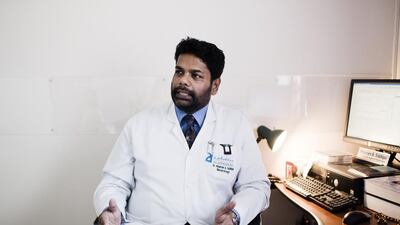ABU DHABI // Life-changing surgery with an 80 per cent success rate in stopping seizures has been available for decades – but not in the UAE.
Dr Khurram Siddiqui is hopeful that a surgical unit to treat epilepsy will be available early next year.
He has been working with a team of neurologists from various government hospitals to set up such a unit.
“Epilepsy surgery has been available since the 1960s,” said the consultant neurologist and epileptologist at Al Ain hospital.
“It is available in Saudi Arabia where they do one a week. In the United States, at some of the good centres, 50 to 60 are done in a year.”
In the UAE, Emiratis with epilepsy are sent to the US and South Korea for the operation, which entails removing a part of the brain.
Over the past two years, about 40 Emirati patients from Al Ain Hospital have been sent abroad for evaluation. Those who had the surgery returned seizure-free.
“We lack the team for such a unit,” Dr Siddiqui said.
“For every 10,000 to 25,000 people there should be one neurologist. In the UAE there is probably one neurologist per 100,000 people.
“There is a need for more neurologists.
“We are now working on changing that by introducing a neurology residency programme at [Al Ain Hospital] to train Emirati graduates in neurology,” he said
Al Ain Hospital is the only medical institution in Abu Dhabi that admits neurology patients rather than offer outpatient care.
Up to 80 per cent of the patients Dr Siddiqui sees at his clinic at Tawam Hospital, where he also works, have epilepsy.
He attends to about 20 patients every week. Some are new cases and others come for follow-ups.
According to him, 60 to 70 per cent of epileptic patients can be treated with medication.
“Those who are not responding to medication can be monitored by recording seizures in a specialised unit, which is currently available only in Tawam hospital,” said Dr Siddiqui.
Patients are treated in a special room with a surveillance camera and are connected to EEG (electroencephalography) electrodes.
Seizures are then induced by reducing the medication and using stimulants such as sleep deprivation.
With this type of monitoring, it can be decided which patients are good candidates for surgery.
The families of patients with epilepsy “are very caring and supportive”, with most understanding that it is a medical condition rather than witchcraft, which was common in the past, Dr Siddiqui said.
“With more awareness, more families are bringing their children to us. Health literacy is gradually improving.”
Previously, patients resorted to seeking treatment from religious healers rather than physicians.
“There is no problem with that. But some of these healers tell them to stop the medication which is prescribed by doctors.”
salnuwais@thenational.ae

